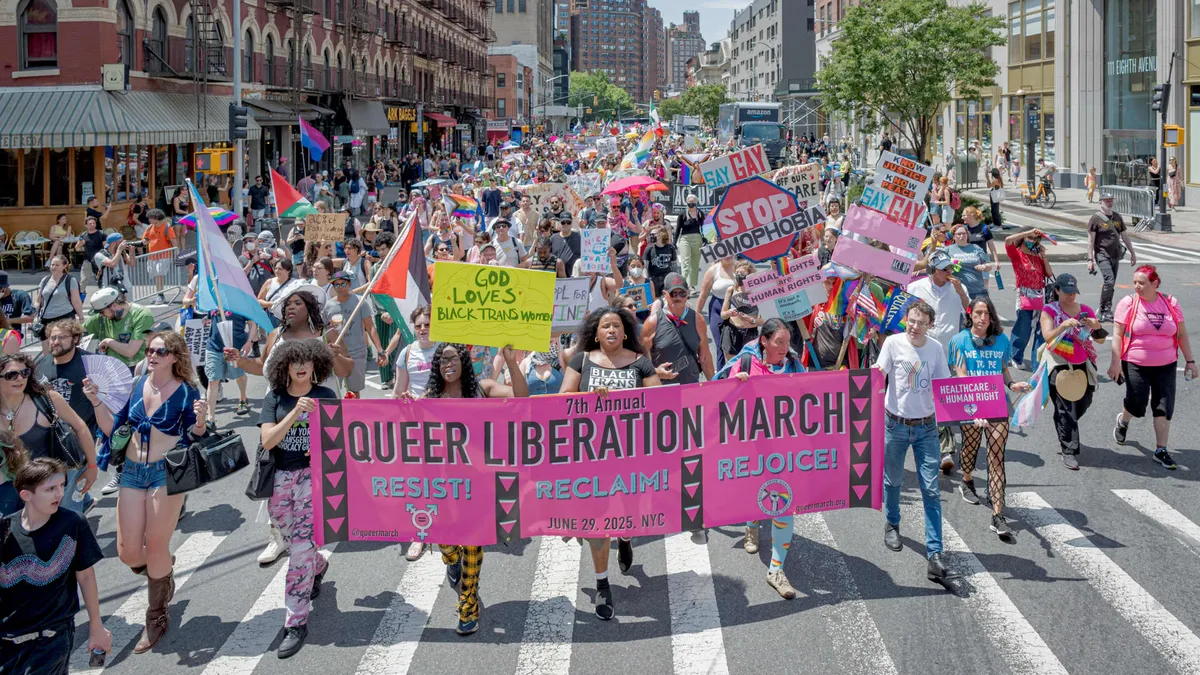
Canadian citizen Robert Sharp had plans to travel to Provincetown, Massachusetts — recognized as one of the most LGBTQ+-friendly destinations in the United States — to celebrate his friend's milestone birthday in July. However, in light of the ongoing trade tensions due to President Donald Trump's tariff policies and the rising anti-LGBTQ+ rhetoric in the U.S., Sharp decided to alter his travel plans. "Do we want to have that stress before going on vacation? Or do we want to support our own country?" Sharp reflected. Ultimately, he and his travel group opted to cancel their trip to Provincetown and instead chose to visit Montreal, Canada.
Sharp and his partner had also considered traveling to Chicago or Fort Lauderdale, Florida for another trip this year. In light of recent events, they shifted their plans to embark on a Canadian road trip from Calgary to Vancouver. "We've been hit hard in Canada with tariffs, and there's been a real sense of patriotism up here. So, we ultimately decided to explore our own country and do a road trip to the Rockies to support our economy," Sharp stated.
Sharp's decision mirrors a broader trend among international travelers who are reevaluating their travel budgets and opting to reduce trips to the U.S. Recent statistics from the International Trade Administration reveal that the number of foreign visitors to the U.S. by air dropped by 10% in March compared to the previous year. When including land border crossings, inbound visitors fell by 14% during the same timeframe. Experts at Oxford Economics project that spending among international visitors to the U.S. will decrease by $8.5 billion this year, largely due to negative perceptions of the U.S. associated with trade and immigration policies.
Among the LGBTQ+ community, there has been a significant decline in bookings for queer-friendly accommodations in the U.S. on the LGBTQ+ travel platform misterb&b. Canadian users reported a 66% decrease in bookings, while European users experienced a 32% decline between February and April compared to the same period last year. Interestingly, the platform noted a 22% increase in bookings from blue states and a 9% decrease from red states during the same timeframe. Cities within red states, including Salt Lake City, Phoenix, and Austin, Texas, also saw a drop in interest.
Sharp, who owns the LGBTQ+-friendly travel company Out Adventures, is not alone in his travel decision. In February, the LGBTQ+ advocacy organization Egale Canada announced that its members would abstain from participating in events in the U.S. this year, notably the WorldPride celebrations in June, due to safety concerns heightened by recent policies under Trump's administration. Executive director Helen Kennedy emphasized that the decision was made primarily to protect individuals' safety from the growing hostility towards LGBTQ+ individuals.
During Trump's second term, several executive orders were signed that adversely affected transgender individuals, including prohibitions on military service and participation in women's sports. Another order that recognizes only two sexes—male and female—has led countries like Denmark, Finland, and Germany to issue travel advisories for LGBTQ+ travelers, particularly transgender individuals. Canada also updated its travel guidance to address concerns for travelers with non-binary gender markers.
Kennedy further explained that the decision to avoid U.S. events was part of a broader resistance to what she views as economic warfare from the U.S. towards Canada. "People talk about Canada and the U.S. having a long history of being incredible neighbors. And yes, we do, but that's based on economic interests a lot of the time," she said. With a typical spend of $3,000 to $5,000 per person for conferences or corporate travelers exceeding $5,000, Kennedy highlighted the potential economic impact of these decisions on the U.S. economy.
The purchasing power of LGBTQ+ consumers is notable, estimated at $1.4 trillion according to a 2022 study by Pride Co-Op. Furthermore, the global LGBTQ+ tourism market size reached $296.8 billion in 2023, with projections indicating it will more than double by 2033, reaching $634.9 billion, as reported by Market.US. Research from Arival Travel shows that LGBTQ+ travelers tend to have higher incomes, with many earning over $150,000 annually, and they often spend more on activities and experiences when traveling compared to other demographics.
John Tanzella, CEO of the International LGBTQ+ Travel Association, noted a noticeable decline in international LGBTQ+ travel to the U.S., as many potential attendees express hesitance about participating in events like the upcoming global convention in Palm Springs, California. Tanzella remarked, "They don't feel welcome here, so why come and spend their money here?" This shift could significantly impact various sectors, from airlines and hotels to local businesses such as barber shops and restaurants that depend on tourism.
Despite concerns about a reduction in international LGBTQ+ travel and some pullbacks in corporate sponsorships for Pride events, many organizations reported strong attendance at Pride Month celebrations across the U.S. Matt Şenız-Cheng, associate director of partnerships for NYC Pride, estimated that attendance for its Pride events totaled around 2.5 million, consistent with historical numbers. Although NYC Pride lost approximately 25% of its corporate sponsorships this year due to economic factors, he predicted that participation in the Pride march would surpass previous years.
Ryan Bos, executive director for the Capital Pride Alliance, expressed satisfaction with attendance for WorldPride despite political tensions, stating that canceling the event would send a negative message to other Pride events facing similar challenges. While exact attendance figures for WorldPride are yet to be confirmed, Bos believes participation was robust.
Conversely, Tanzella noted that attendance numbers for WorldPride appeared to be down this year. However, Pride celebrations in red states have continued successfully, with attendance rising from 28,000 last year to 33,000 at Phoenix Pride's annual Rainbows Festival this April. Similarly, SLC Pride in Salt Lake City saw attendance increase from 10,000 to 17,000 this year. Festival director Bonnie O'Brien noted that while they may not attract extensive foreign visitors, they expect support from nearby communities seeking a sense of safety and belonging.